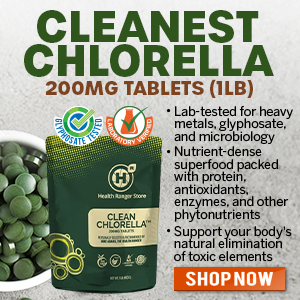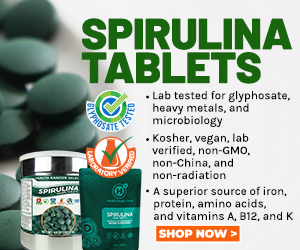
Is your diet causing your depression?
Sunday, December 02, 2012 by: J. D. Heyes
Tags: diet, depression, mental health
- European Court of Justice: Healthcare professionals who promoted or administered COVID-19 vaccines are CRIMINALLY LIABLE for any harm caused
- “Old Man in a Chair”: The COVID-19 pandemic was a carefully orchestrated scheme for global control
- Cinnamon plays a critical role in diabetes management
- FRAUD ALERT: Details DEMOCRATS do NOT want you to know about the $40 BILLION wasted on Fed-loaded credit cards cancelled by DOGE
- Scientists unveil breakthrough method to eliminate "Forever Chemicals" from water, transforming waste into graphene
- Massive egg substitution recall: Bleach contamination sparks nationwide concern
- Postcard from 1875 highlights smallpox vaccine’s failure: Lessons for today’s COVID-19 response
- Newly released JFK files reveal Pentagon's role in creating Lyme disease and covid in the same lab
- DOGE finds evidence of Social Security fraud and illegal immigrant voter registration
- Zelensky defies Trump, rejects U.S. aid repayment and mineral deal amid rising tensions
- World Health Organization in crisis, prepares for DOWNSIZING after U.S. withdrawal and funding problems
- AI-powered forecasting model proves more accurate than traditional systems at predicting the weather
- Trump administration deploys spy satellites to enhance southern border surveillance
- Pentagon memo suggests U.S. will not defend Europe from Russian aggression, prioritizing China and homeland security
- Preparing for the unthinkable with William Brocius’ “How to Survive the Death of the Dollar”
- Science proves PASSION FRUIT is a powerful medicine for the GUT and the HEART
- Oncologist warns of ‘terrifyingly aggressive’ cancers in children, linked to immune suppression from COVID vaccines
- Israel's war on Gaza's healthcare: Over 1,400 medical workers killed in attacks
- Newly released JFK files reveal Pentagon's role in creating Lyme disease and covid in the same lab
- CDC finally halts $11 billion COVID funding scam as health officials admit the ‘pandemic’ was a fraud
- Analysis: The coming economic collapse, a mass uprising and Trump's three secret weapons to halt the growing revolt
- Kiss Your Genetic Privacy Good-Bye! 23andMe Gets Green Light to Sell Your Intimate Genetic Details to Anyone They Want
- Dr. Suzanne Humphries makes bombshell appearance on Joe Rogan podcast, exposing vaccine industry deception back to POLIOMYELITIS
- DEADLY DECEPTION: How COVID vaccines increased mortality rates and why authorities hid the truth
- Woman contracts WORLD'S DEADLIEST VIRUS after unknowingly being given the WRONG VACCINE
- Oncologist warns of ‘terrifyingly aggressive’ cancers in children, linked to immune suppression from COVID vaccines
- Here are TEN all-natural ways to protect your garden without using harmful chemicals
- Black cumin seed oil emerges as a powerful ally against breast cancer and chronic inflammation
- The hidden dangers in your kitchen: How cooking methods impact diabetes, cancer and aging
- Trump's greatest betrayal so far: Accelerating Middle East wars, silencing dissent, and serving Zionist masters
- Senate Democrats deny censorship industrial complex existed, defend government's role in silencing dissent
- Sugar-free deception: Artificial sweeteners hijack hunger signals, fuel obesity epidemic, study warns
- “Independent” anti-Russia outlet MEDUZA faces COLLAPSE as US funding dries up
- NIH study, buried for decades, reveals that Flu Shots INCREASE elderly deaths, not prevent them
- The Health Ranger releases “Vaccine Zombie” song and music video, using AI-animated zombies for the music video
- Discovery of vast underground city beneath Giza pyramids challenges human history
- Newly released JFK files reveal Pentagon's role in creating Lyme disease and covid in the same lab
- California's social media censorship law struck down: A victory for free speech or a threat to online safety?
- EPA advisor admits the agency is funneling billions to climate groups ahead of Trump’s return to White House
- The Health Ranger releases “Vaccine Zombie” song and music video, using AI-animated zombies for the music video
- Dr. Mike Yeadon releases 15-minute testimony - WATCH - about genocidal intent of COVID “vaccines”
- Florida takes a stand: DeSantis proposes permanent ban on mRNA vaccine mandates
- Mike Adams releases country western hit single: Goin’ Back in Time is Comin’ Home
- “Why we influenced the 2020 elections”: Facebook files reveal the coordinated effort to bury the Hunter Biden laptop story
- Unpacking the Lies That We’ve Been Fed – new song and music video released by Mike Adams, the Health Ranger
- House Intelligence Committee calls for the ARREST and PROSECUTION of Dr. Anthony Fauci
- The pandemic as a tool for INDOCTRINATION: Understanding “The Indoctrinated Brain” by Dr. Michael Nehls
- Rep. Nancy Mace introduces bill to ban biological males from female facilities on federal property
- Mike Adams releases music poetry sensation: A Child of God
- Sugarcane extract superior to cholesterol-lowering drugs?
- Survival 101: Effective EMF blocking techniques
- Michigan sheriff announces criminal investigation into 2020 election crimes, Dominion Voting Systems
- Peter Rost exposes Big Pharma corruption in his book “The Whistleblower: Confessions of a Healthcare Hitman”
- Migrants are taking advantage of recent hurricanes to scam residents and loot their homes
- Red Cross issues warning to stop blood plasma donations from vaccinated people
- Scientists confirm: GENIUS brain function can be spontaneously unleashed in humans without any apparent cause
- EPA advisor admits the agency is funneling billions to climate groups ahead of Trump’s return to White House
- HYSSOP: What research reveals about the health benefits of this ancient holy herb
- Two containers with completed ballots fall out of truck in Florida
- Fully vaccinated about to see “tsunami” of illness and death, warns virologist
- Global leaders unite to clamp down on “misinformation” with UN-backed Cascais Declaration
- BREAKING: 2025 NDAA authorizes mandatory military draft of WOMEN across America… as Pentagon pursues global NUCLEAR war with both Russia and China at the same time
- Michael Yon warns of a ZIONIST TAKEOVER in Trump’s second administration
- BOMBSHELL: DNA testing kits are a SCAM to develop ethnic-specific bioweapons
- Ozempic and Wegovy weight loss drugs are injectable LIZARD VENOM PEPTIDES that may unleash a devastating wave of organ failure… side effects align with symptoms of SNAKE BITES
- Israeli soldiers accused of even more torture and abuse in the West Bank
- These 13 countries just signed an agreement to engineer a global FAMINE by destroying food supply
- NASA admits that climate change occurs because of changes in Earth’s solar orbit, and NOT because of SUVs and fossil fuels
- RFK Jr. clears key hurdle: Sen. Susan Collins backs controversial HHS nominee, signaling a new era for health policy
- Sermon 30: How Jesus reveals Caesar’s FAKE CURRENCY and FALSE AUTHORITY
- Coriander seeds: Ancient medicine backed by modern science
- Arizona officials claim Maricopa County needs 10-13 days to tabulate results of the election
The good news for depression sufferers; however, is that because diet may be affecting your mood, your condition is very treatable naturally.
A recent meta-analysis of 11 longitudinal studies involving unipolar depression and/or symptoms of depression in adults between the ages of 18-97 years found a distinctive link between said depression and diet. Follow-up for these studies ranged from two to 13 years, according to Diet and the risk of unipolar depression in adults: systematic review of cohort studies.
"Researchers found an inverse association between depression risk and folate, omega-3 fatty acids, monounsaturated fatty acids, olive oil, fish, fruits, vegetables, nuts and legumes. Results indicate that diet and nutrition may influence depression risk," says an abstract of the findings by a team of researchers from Oxford University in Great Britain.
Yet more evidence of a link between diet and depression
The meta-analysis confirmed findings from earlier, unrelated studies, in which researchers from the U.S. essentially found a similar link between nutrition and depression, though traditional clinical practice is to treat depression chemically.
"When researchers came up with the term 'brain chemical imbalance' to explain depression, the next step should have been to supply the brain with nutrients. However, chemicals were prescribed instead," Carolyn Dean, M.D., an author and medical director of the Nutritional Magnesium Association, told Everyday Health.
The website noted that earlier studies have shown that a diet rich in what medical professionals describe as "whole foods" also lowers the risk of depression, while diets that consist primarily of processed foods may actually work to increase the incidence of depression.
That's because, researchers say, whole foods are natural and thus have all of their nutrients intact. They are also devoid of additives, unlike processed foods which contain many additives and have most often lost much of their nutritional value.
It is this loss of vital nutrients scientists believe is likely the root cause of depression.
"We know that nutrients such as magnesium, essential fatty acids, and vitamin B6 and B12 help create neurotransmitters, and we are also learning that a deficiency in these nutrients can lead to a chemical imbalance in the brain," Dean said, adding that neurotransmitters are chemicals in the brain that transmit signals between nerve cells.
Depression can result with these neurotransmitters becoming deficient.
Series of studies provide better understanding
A growing body of research has strengthened the belief among health practitioners and scientists alike that diet and depression are inextricably linked:
-- A recent study in the American Journal of Psychiatry contrasted a diet of whole-food fruits, vegetables, grains and fish with a diet high in processed meats, grains and fast foods. Researchers found that study participants who ate the whole foods had a third less risk of developing depression.
-- A study published in the British Journal of Nutrition found that, after five years, people who ate a diet rich in veggies, fruits and fish versus those whose diets were loaded with sweetened desserts, processed meats and grains had less risk of developing depression.
-- Yet another small study, this one published in the British Journal of Nutrition, found that people with decreased fat intake had a 25 percent higher risk of depression than those who consumed healthy sources of dietary fat such as omega-3 fats, which are found in fish (salmon and tuna), as well as flaxseed and walnuts.
-- Still another study published in the Archives of General Psychiatry found that diets high in processed foods, sugar and non-healthy dietary fat increases the risk of obesity, and that the additional weight then led to an increased risk of depression.
Sources:
http://www.vitasearch.com/get-clp-summary/40464
http://www.everydayhealth.com
https://www.naturalnews.com/037021_foods_depression_mental_health.html
Diet at FETCH.news
Get independent news alerts on natural cures, food lab tests, cannabis medicine, science, robotics, drones, privacy and more.
Take Action: Support Natural News by linking to this article from your website
Permalink to this article:
Embed article link: (copy HTML code below):
Reprinting this article:
Non-commercial use OK, cite NaturalNews.com with clickable link.
Follow Natural News on Facebook, Twitter, Google Plus, and Pinterest
Science News & Studies
Medicine News and Information
Food News & Studies
Health News & Studies
Herbs News & Information
Pollution News & Studies
Cancer News & Studies
Climate News & Studies
Survival News & Information
Gear News & Information
News covering technology, stocks, hackers, and more



"Big Tech and mainstream media are constantly trying to silence the independent voices that dare to bring you the truth about toxic food ingredients, dangerous medications and the failed, fraudulent science of the profit-driven medical establishment.
Email is one of the best ways to make sure you stay informed, without the censorship of the tech giants (Google, Apple, Facebook, Twitter, YouTube, etc.). Stay informed and you'll even likely learn information that may help save your own life."
–The Health Ranger, Mike Adams













































